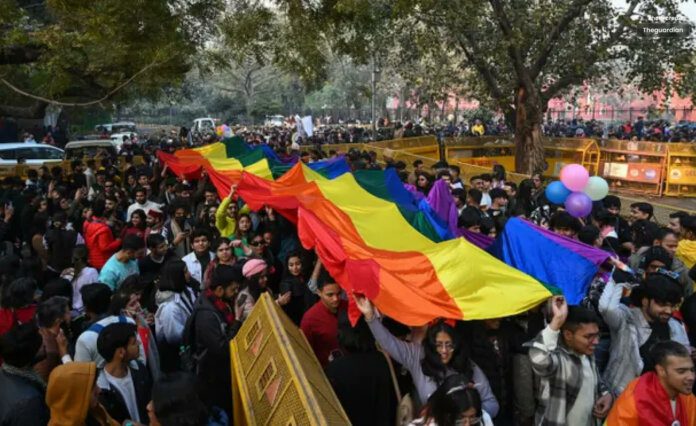Indian SC hears LGBTQ marriage rights; govt opposes same-sex marriage.
Opposition from the Indian Government:
On Monday, the Hindu nationalist government led by Prime Minister Narendra Modi submitted a forceful affidavit to the Supreme Court, arguing against same-sex marriage and urging the court to dismiss the case. The government views same-sex marriage as an “urban elitist concept” that undermines religious and social values. The government’s submission claimed that “a valid marriage is only between a biological male and a biological woman” and that any equality given to same-sex couples would violate religious values and “seriously affect the interests of every citizen.” The government also insisted that parliament, not the courts, should make such decisions.
Reasons for Legalization of Same-Sex Marriage:
Several petitions from LGBTQ couples and activists have been brought before the Supreme Court as part of a joint lawsuit that advocates for the right of LGBTQ people to marry and have equal rights under the law. The motivations for the case are both practical, such as the need for a joint bank account and the ability to give each other medical consent, and fundamental, as it is believed that India, as a democracy, is a place where diversity, equality, and justice for all are upheld, and LGBTQ rights are not inferior to those of others under the constitution.
Societal Shift in India:
The hearings on same-sex marriage take place amid a gradual societal shift in India, where LGBTQ people are gaining more visibility, particularly in popular culture and in pride marches held in major cities. Although there is a growing awareness around the right to equality, many acknowledge that full social acceptance and freedom from stigma and harassment is still a long way off, as the country remains deeply traditional and patriarchal.
Optimism and Expectations:
The lawyers and petitioners who brought the lawsuit are hopeful about the case, noting that the Supreme Court has made significant rulings on LGBTQ rights, even in the face of government opposition. For instance, a 2014 case recognized transgender people as a “third gender.” Menaka Guruswamy, one of the lawyers fighting the case, who was also involve in the decriminalization of homosexuality case in 2018, expresse confidence in the court’s decision.
Implications of the Case of Same-Sex Marriage:
The case raises several issues, not only marriage but also the rights of same-sex couples to adopt children and for their families to have the same rights as heterosexual parents. The National Commission for Protection of Child Rights, a government agency, has also opposed this matter, which argued in a submission to the Supreme Court that “allowing the adoption to same-sex couples is akin to endangering children.” The case also advocates for the rights of trans people to have their relationships and families of choice legally recognized.
Conclusion:
If same-sex marriage becomes legal in India, it will only be the second country in Asia after Taiwan to do so. The case is not solely about marriage but about ensuring equality for all under the constitution and the right to marry whomever one chooses, regardless of gender, religion, or caste, which is significant at a time when inter-faith and inter-caste marriages are under attack from the Hindu right-wing. The case has implications for the rights of LGBTQ couples, trans people, and the protection of children.




